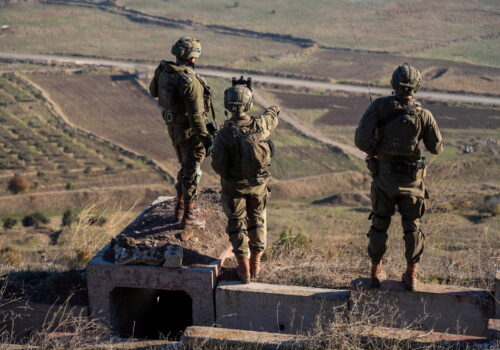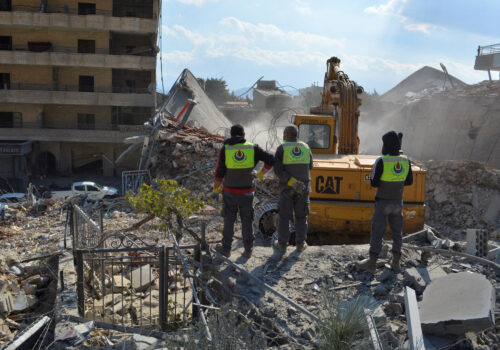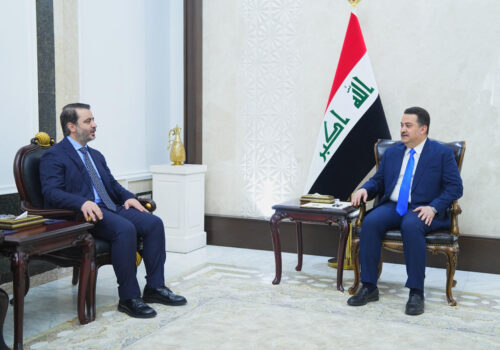The only viable solution: an independent Syria, not a Turkish protectorate
After supporting various opposition factions throughout the Syrian civil war, a risky policy that frequently seemed to be failing, Turkish President Recep Tayyip Erdogan’s gamble on the rebels appears to have paid off with the toppling of former Syrian president Bashar al-Assad.
The historic development has many benefits for Turkey, but Ankara has two contrasting visions for this new Syria. One envisions a stabilized and independent (albeit militarily weak) country, while the other envisions a Syria that would function as a Turkish protectorate state.
Both visions share the need for a reunified Syria with a centralized regime, but they differ substantially in the means to, and motives for, that end. However, one of these options—the vision of Syria as a forward base for Turkey—brings with it a particularly enhanced risk of regional concerns and inter-state instability. At this fragile moment, all actors now involved in negotiations with Damascus over reconstruction would be wise to push for a more independent Syria.
Turkey as a strategic hub
In one vision, Syria becomes a safe transit point for trade and energy routes, with Turkey as a hub from the Gulf states to Europe. This vision can only translate into a reality if Syria secures desperately needed foreign investment and reconstruction. For that investment to take place, Damascus is tasked with appealing to different regional and international actors.
Syria cannot be seen as leaning too much on Turkey, nor can it be seen as presenting a new threat to neighboring states. Israel is concerned about the emerging regime in Syria because of the Jihadist background of some of its members. It is trying to advance through political channels and military actions a demand that Syria be demilitarized south of Damascus.
While Israel’s demands may seem far-reaching, they do indicate that, following the surprise attack of October 7, 2023, Israel is far less willing to take any chances regarding worrying developments from its neighbors.
Risks of a more ambitious Ankara
Turkey’s second, dueling vision is more ambitious, pursuing Syria as a forward post and part of Ankara’s exclusive zone of interest. As Erdogan stated, “the events in Syria remind us that Turkey is bigger than Turkey itself.” This vision includes erecting Turkish bases within the country. Reports of defense discussions between Ankara and the new regime, led by Hayat Tahrir al-Sham, in Damascus seem to suggest Ankara has its eye on using Syrian territory to strengthen its defense. Indeed, Turkey has significant security concerns in Syria, ranging from jihadist and Kurdish terror threats on its borders to domestic concerns over refugees and its own Kurdish minority.
For a view from Turkey, read more by Ömer Özkizilcik
As the situation in Syria presents a direct threat, there is more willingness in Turkey to cover the financial costs to deal with it. This was very much the situation in the areas Turkey took control of within Syria since its first operation in northern Syria in 2016, after which Turkey had invested money in reconstruction and supplying basic services.
SIGN UP FOR THIS WEEK IN THE MIDEAST NEWSLETTER
Hence, Turkey, with Qatar’s help, may be willing to pay the price for at least partial reconstruction of Syria. This would be a boon for Turkish construction companies, and even if the Turkish government partly funded it, it could have positive economic trickle-down effects.
Still, there are risks in this strategy, namely from regional actors in the Middle East becoming skeptical of why Ankara would pursue a front post in Syria. The larger Turkish deployments become, and especially if Turkey builds bases in southern Syria, the more concern it will raise—posing the risk that the wider region isolates Ankara, as was the case in 2019-2020.
A future for Syrian stability
Turkey is weighing where to place its bets between these options in Syria. This indecision can explain the contrast between Ankara’s more careful and more adventurous moves regarding the new government in Damascus.
It should be stressed that Turkey would only be persuaded to support the more independent Syria scenario if it ensures Damascus gets significant amounts of financial assistance, and if Washington makes it clear to Ankara that building Turkish bases cannot be tolerated by Israel and other regional players such as Saudi Arabia, and hence should be averted.
Turkey has already built forward base capabilities in places such as northern Cyprus and Qatar, and expanding its military presence in Syria will create what some have termed “Turkey’s full moon,” a would-be regional threat after the weakening of the Iranian-led “Shiite crescent.”
Syrian people, after all their suffering during the civil war, deserve a secure environment to rebuild. Giving Syria to Turkey will harm such a prospect.
Gallia Lindenstrauss is a senior researcher at the Tel Aviv-based Institute for National Security Studies (INSS) and co-editor of the Institute’s journal Strategic Assessment.
Further reading
Tue, Mar 25, 2025
Dispatch from Bekaa: Inside the sectarian skirmishes on the Syria-Lebanon border
MENASource By Nicholas Blanford
Local Shia tribesmen have battled an assortment of Sunni jihadist militias and the new Syrian security forces dominated by Hayat Tahrir al-Sham (HTS).
Wed, Mar 19, 2025
Inside Hayat Tahrir al-Sham’s diplomatic offensive with Syria’s Christians and Ismailis
MENASource By
HTS’s diplomatic offensive demonstrates the leadership’s political approach, which evolved over years of engaging with the Christian and Druze communities in Idlib.
Wed, Mar 19, 2025
Why the United States must bridge the Iraq-Syria divide
MENASource By Sarkawt Shamsulddin
With leverage over both capitals, the United States emerges as the linchpin in delicate diplomatic moment between Baghdad and Damascus.
Image: Turkish President Recep Tayyip Erdogan holds a joint press conference with Syria interim President Ahmed al-Sharaa in Ankara on Febuary 4, 2025. Ahmed al-Sharaa and Turkish President Recep Tayyip Erdogan are expected to discuss a joint defense pact in Ankara on Tuesday, including the establishment of Turkish airbases in central Syria and training for Syrias new army, four sources familiar with the matter told Reuters. This marks the first public indication of a potential long-term military cooperation between Türkiye and Syrias new government following the ousting of Bashar al-Assad in December 2024. (Turkish presidential press service via EYEPRESS)



